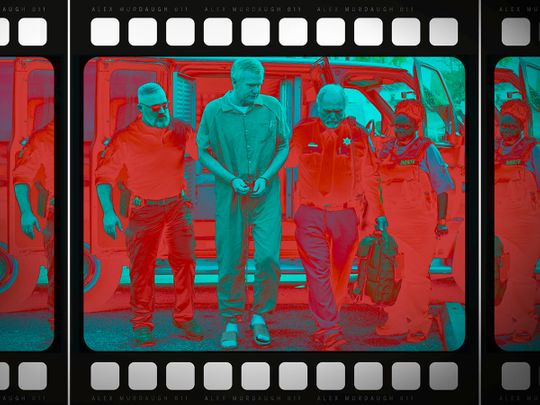
If you heard of an American in recent weeks who had not followed the Alex Murdough trial, which dominated headlines and cable news channels for the five weeks it lasted between Jan. 25 and March 2, that American most likely had been vacationing in Mars at the time and thus missed out on all the action.
Save for that American, along with others like him vacationing in faraway planets, Americans in virtually every state of the Union knew of the trial and knew that Alex Murdough, scion of a dynastic family in South Carolina, was the man whom a jury had found guilty of murder and a judge sentenced to life behind bars without the possibility of parole.
Case closed? Yes, but let’s ponder the issue of why Americans are notorious for obsessing over crime, criminals and criminal trials.
Surely, when the criminal mind fascinates a people, as it has long fascinated Americans, who can’t seem to get enough of TV shows (like, say, Poker Face, 2023), movies (The Godfather, 1973) and novels (In Cold Blood, 1966) that glamorise or at the least humanise it, the issue should interest not just anthropologists but mere humble folks like us who happen to be a touch intellectually inquisitive.
Following the case
And if you think Americans’ obsession with outlaws, along with the justice system that passes judgement on them, is no more fervent than that evinced by other peoples in other cultures, then consider the high-profile trial of O.J. Simpson, that opened on Jan. 24, 1995, where the defendant was accused — and later found not guilty by a jury of his predominantly African American peers — of stabbing to death his ex-wife, Nicole Brown, and her friend, Ronald Goldman, outside Brown’s condo in Brentwood, an upscale neighbourhood in Los Angeles.
How many Americans followed the case? Well, on the morning of Oct. 3, 1995, when it was announced that that the jury was ready to deliver its verdict, America virtually came to a standstill and daily life was momentarily put on hold as 150 million Americans tuned in to learn the fate that awaited the famous Hall of Fame football player. Then this is what followed.

Trading volume on the New York Stock Exchange dropped by 41 per cent. Government meetings were delayed and press conferences were postponed. Water usage decreased because people, not wanting to miss out on seeing for themselves, then and there, the jury’s decision, were reluctant to go to the bathroom. And, yes, the president of the United States reportedly left the Oval Office to watch the verdict with his staff.
Interest is not fascination and fascination is not obsession. Americans are not merely interested in or fascinated by crime, like the rest of us, they are obsessed with it.
Look, we all, whatever culture we are the product of, find true crime seductive and those who commit it beguiling, for it’s in our human nature to be at once attracted to and repelled by whatever seems adversarial in our lives. But Americans’ obsession, however, goes over the top.
Myth of the outlaw
And I want to speculate that it does so because the myth of the outlaw is woven into the fabric of American culture (and thus consciousness) where the outlaw is seen as hero, as role model, as chevalier, a man whose sensibility was shaped by the harsh landscape of the aptly named Wild West, a land where it’s a free-for-all — in both senses of the word.
There, rugged individuals, motivated by a nonconformist bent of mind, inhabited a rough and tumble frontier that demanded from those who inhabited it engagement in risky, dangerous and at times criminal activity in order to secure food and territory.
The spirit of that frontier in time produced train robbers, cattle rustlers and swashbuckling, cold-blooded killers, like Jesse James, Billy the Kid, Butch Cassidy and the notorious John Wesley Harding, who, when asked why he had killed so many men, responded flippantly, “I never killed anyone who didn’t need killing”.
Americans’ love affair with the criminal mind continued well into the first half of the 20th century, especially during the Great Depression, when popular culture idolised and transformed into legends figures like John Dillinger, Bonnie and Clyde, Al Capone and the notorious bank robber Willie Sutton, who, when reporters asked him why he robbed banks, famously quipped, “That’s where the money is”.
Even in our time, that love affair has shown no signs of cooling. Americans have continued to follow the exploits of murderers, wise guys, gun-wielding desperados and con men, including embezzlers like Bernie Madoff, mastermind of the mother of all Ponzi schemes in history, who, eh, made off with $65 billion of investors’ money.
This fascination extends — disturbingly, psychologists may opine — to serial killers as well — both in real life, such as David Berkowitz (also known as Son of Sam), Charles Manson and Ted Bundy; and in fiction, such as, to name just one, Hannibal “the cannibal” Lecter.
Fascination with crime
At the Academy Awards in 1991, The Silence of the Lambs won five Oscars in all five categories — best film, best actor, best actress, best director and best screenplay. The film, adapted from a 1988 novel, tells the story of the search by an FBI agent (Jodie Foster) for a serial killer known as Buffalo Bill. The search becomes facilitated after the agent used information provided by another serial killer, Hannibal “the cannibal” Hecter.
The film grossed $272 million (on a budget of $19) and was named “culturally, historically or aesthetically significant” by the US Library of Congress.
Americans love not just the serial killer next door but the criminal at large — so long as he or she is not a nameless, faceless high school dropout from the wrong side of the racial tracks — whose adventures they never cease to get enough of.
For, let’s face it, the Alex Murdaugh trial may have been, at its core, about murder, but it was also about corruption, fraud and drug abuse by the scion of a once famous — and now infamous — family of lawyers that since the 1920s had wielded considerable, unfettered influence in large swaths of rural South Carolina.
Now how could you, were you American, not love a saga like that?
Fawaz Turki is a noted journalist, academic and author based in Washington. He is the author of The Disinherited: Journal of a Palestinian Exile.












